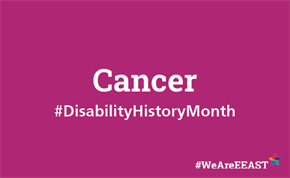
This Disability History Month, the third condition we are focusing on is cancer.
What is Cancer?
Cancer is a group of various diseases, which affects different parts of the body. Cancer starts when abnormal cells form in an uncontrolled way and can spread if not caught early enough.
There are several groups of cancers, the main ones being: carcinomas, lymphomas, leukaemias, brain tumours and sarcomas.
One in two people will develop some form of cancer during their lifetime. In the UK, the four most common types of cancer are:
You can find out more about the different types of cancer via the Cancer Research UK website.
There are more than 200 different types of cancer, each of which is diagnosed and treated in a particular way. You can find out more about the different types of cancer via the NHS website.
Living with Cancer
Living with cancer varies from person to person; those who have cancer deal with it in different ways, the same way that family and friends will deal with it in other ways.
Patients will learn how to manage their treatment, they will have regular scans, check-ups, blood tests, and appointments.
Family, friends and colleagues should be there to help and support their loved ones suffering from cancer.
A personal perspective
“A member of my family doesn’t want me to know about their cancer, it doesn’t matter how, but I do know what is going on. Four years ago, they were diagnosed with stage 4 breast and lymphoma cancer, and the prognosis isn’t good, and they have hidden themselves away from most people.
There is no cure, just borrowed time, living as a family member who has cancer is hard, but I keep going with the support of family, friends, and colleagues.”
Cancer as a disability
Cancer is recognised as a disability, from the point of diagnosis and for the rest of that person’s life.
This means you can ask your employer for reasonable changes in your workplace, such as needing time off for treatment and recovery or flexible working hours. The Act also legally protects you if you feel your employer has treated you unfairly.
It is important you talk to your employer and manager so they can support you and obtain reasonable adjustments, which you can do via Occupational Health and Access to Work.
You can find out more about cancer and employment rights via the Macmillan Cancer Support website.
Past, present, future
In the 16th-19th century, as doctors began to dissect bodies to discover causes of death, they learnt more about cancer.
The use of the microscope has enabled physicians to identify various insights to different types of cancers and by the end of the 19th century and the start of the 20th century treatments such as radiation and chemotherapy became available.
Fast forward to today and there are 100s of clinical drug trials being undertaken all over the world for all types of conditions that are advancing every day.
Cancer survival has risen over the last 15 years and with better treatments and knowledge of how to treat and control cancer, survival rates should continue to improve.
Published 1st December 2022